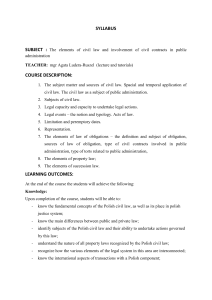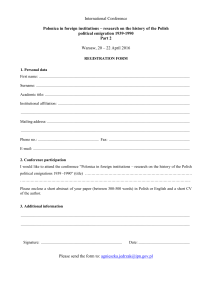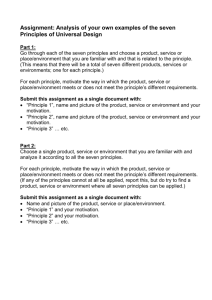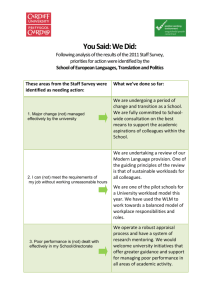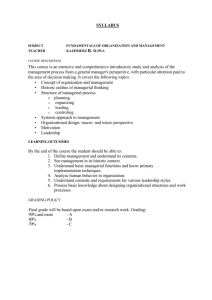Features and skills that determine the work of risk managers
advertisement
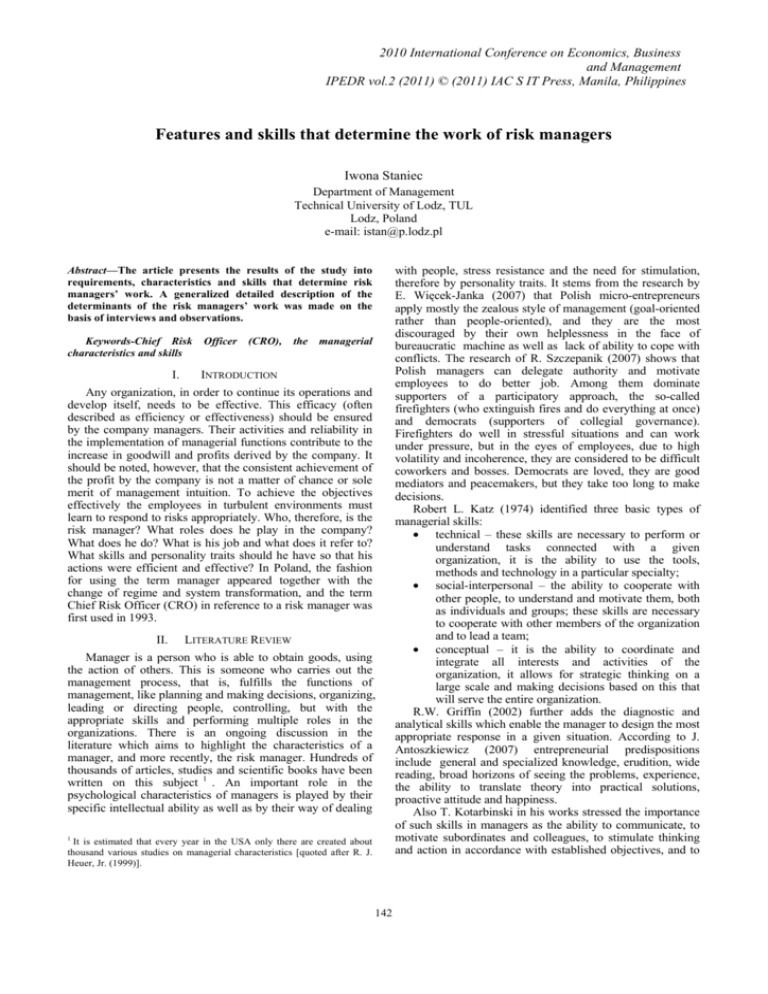
2010 International Conference on Economics, Business and Management IPEDR vol.2 (2011) © (2011) IAC S IT Press, Manila, Philippines Features and skills that determine the work of risk managers Iwona Staniec Department of Management Technical University of Lodz, TUL Lodz, Poland e-mail: istan@p.lodz.pl Abstract—The article presents the results of the study into requirements, characteristics and skills that determine risk managers’ work. A generalized detailed description of the determinants of the risk managers’ work was made on the basis of interviews and observations. Keywords-Chief Risk characteristics and skills I. Officer (CRO), the managerial INTRODUCTION Any organization, in order to continue its operations and develop itself, needs to be effective. This efficacy (often described as efficiency or effectiveness) should be ensured by the company managers. Their activities and reliability in the implementation of managerial functions contribute to the increase in goodwill and profits derived by the company. It should be noted, however, that the consistent achievement of the profit by the company is not a matter of chance or sole merit of management intuition. To achieve the objectives effectively the employees in turbulent environments must learn to respond to risks appropriately. Who, therefore, is the risk manager? What roles does he play in the company? What does he do? What is his job and what does it refer to? What skills and personality traits should he have so that his actions were efficient and effective? In Poland, the fashion for using the term manager appeared together with the change of regime and system transformation, and the term Chief Risk Officer (CRO) in reference to a risk manager was first used in 1993. II. LITERATURE REVIEW Manager is a person who is able to obtain goods, using the action of others. This is someone who carries out the management process, that is, fulfills the functions of management, like planning and making decisions, organizing, leading or directing people, controlling, but with the appropriate skills and performing multiple roles in the organizations. There is an ongoing discussion in the literature which aims to highlight the characteristics of a manager, and more recently, the risk manager. Hundreds of thousands of articles, studies and scientific books have been written on this subject 1 . An important role in the psychological characteristics of managers is played by their specific intellectual ability as well as by their way of dealing 1 It is estimated that every year in the USA only there are created about thousand various studies on managerial characteristics [quoted after R. J. Heuer, Jr. (1999)]. 142 with people, stress resistance and the need for stimulation, therefore by personality traits. It stems from the research by E. Więcek-Janka (2007) that Polish micro-entrepreneurs apply mostly the zealous style of management (goal-oriented rather than people-oriented), and they are the most discouraged by their own helplessness in the face of bureaucratic machine as well as lack of ability to cope with conflicts. The research of R. Szczepanik (2007) shows that Polish managers can delegate authority and motivate employees to do better job. Among them dominate supporters of a participatory approach, the so-called firefighters (who extinguish fires and do everything at once) and democrats (supporters of collegial governance). Firefighters do well in stressful situations and can work under pressure, but in the eyes of employees, due to high volatility and incoherence, they are considered to be difficult coworkers and bosses. Democrats are loved, they are good mediators and peacemakers, but they take too long to make decisions. Robert L. Katz (1974) identified three basic types of managerial skills: • technical – these skills are necessary to perform or understand tasks connected with a given organization, it is the ability to use the tools, methods and technology in a particular specialty; • social-interpersonal – the ability to cooperate with other people, to understand and motivate them, both as individuals and groups; these skills are necessary to cooperate with other members of the organization and to lead a team; • conceptual – it is the ability to coordinate and integrate all interests and activities of the organization, it allows for strategic thinking on a large scale and making decisions based on this that will serve the entire organization. R.W. Griffin (2002) further adds the diagnostic and analytical skills which enable the manager to design the most appropriate response in a given situation. According to J. Antoszkiewicz (2007) entrepreneurial predispositions include general and specialized knowledge, erudition, wide reading, broad horizons of seeing the problems, experience, the ability to translate theory into practical solutions, proactive attitude and happiness. Also T. Kotarbinski in his works stressed the importance of such skills in managers as the ability to communicate, to motivate subordinates and colleagues, to stimulate thinking and action in accordance with established objectives, and to strengthen the tendency to take up independently both internal and external activity [10, pp. 25]. The basic competencies of managers as indicated by D. Thierry and Ch. Sauret (1994) are: • the ability to search for and process information, • the ability to work in a team and cooperate with other people, • the ability to function in increasingly complex organizations, • the ability to state problems and seek solutions, • the ability to categorize problems according to their significance, • the ability to respond to unforeseen situations, • the ability to organize their work, • the ability to act on their own, • the ability to set objectives and priorities, • the ability to create an action plan, • the ability to organize work of others, to manage resources, to set directions and to negotiate objectives, • the ability to make decision and seek compromises and solutions, • the ability to analyze and monitor the results. M. Hopej (2005) believes that the manager should be characterized by three basic features: • competence (ie. the ability to shape organizational culture, vision of the organization and to awaken creativity in colleagues and subordinates), • responsibility in the management of their own resources (not to make too great demands of oneself, to ably benefit from colleagues and subordinates assistance, not to be a workaholic), • decency (exposing modesty and humility, it is important to respect the rights of colleagues and subordinates). The research on the effectiveness of the managers’ work shows that the interpersonal skills and so-called emotional intelligence result in much better work. According to R. Stogdill (1974) managers who are effective in managing a company are characterized by responsibility, enthusiasm and perseverance in achieving objectives, entrepreneurship and initiative, innovative formulating of problems to be solved, self-confidence and self-awareness, readiness to accept the consequences of their decisions and actions, tolerance to frustration and stress, and the ability to influence others. A study published by W. Żółcińska (2008) shows that Polish managers are characterized by knowledge absorbency – they want to learn, they strive to be the best in their profession and they don’t differ from their foreign colleagues in the assessment of the international socio-economic situation. Analysis of organizational values implies that Polish managers show low level of such values as ambition, foresight, competitiveness, fighting spirit, innovation, and success. However, there are no major differences between Polish managers and managers from other countries in terms of values referred to as quality, innovation, satisfaction [2]. W. J. Karna (2001) describes the life style of a Polish manager on the basis of the research as: full of surprises, full of stress, exhausting but rewarding. In conclusion it must be said that the perfect manager should theoretically be characterized by: • flexibility, i.e. a skillful adaptation to existing circumstances and the effective use of knowledge, capabilities and skills, • experience and knowledge – it is necessary to have the wisdom of life combined with the extensive factual knowledge, • empathy – skillfully controlled, • economy, the ability to anticipate, risk assessment and establishing the measures of its impact on the objectives pursued. III. METHODOLOGY The survey was carried out in 2008 and 2009 and consisted of interviews conducted with 103 managers representing 40 different companies (the financial sector was not taken at all into consideration): 10 from each of commercial, manufacturing, administrative and service sector, and of observation of their work. In all the surveyed companies the risk management process was observed, although its duration, management style and level of maturity of the process were varied. The managers who deal with risk management were selected for the survey on the basis of interviews with their presidents, directors and superiors. If in a given organization there was a position of risk manager or specialist, it was him primarily with whom the interview was conducted and whose work was observed. It was noticed in the study that sometimes around the risk manager there is the atmosphere unfavourable for achieving the objectives. The most common problems identified by managers in this area are: • manager’s dependence upon the interests of senior managers within the organization (lack of independent evaluation and conduct), • total independence of the manager which turns into his alienation, • reproduction of habits and thinking stereotypes of the other managers, • a considerable amount of time is needed to learn about the organization and to introduce permanently any value added. IV. THE RESULTS OF ANALYSIS The purpose of the risk manager’s activity is to implement methods which properly applied provide transparency of action, allow for the detection and elimination of irregularities occurring in the organization, identify the potential vulnerabilities, improve processes, etc. which in turn leads to the increased efficiency in functioning of individuals and prepares them for adoption of unpredictable external and internal factors. Among the respondents, four basic groups of risk managers were identified. The first group consists of risk analysts, who in their daily work evaluate the dangers threatening each process by monitoring the factors which cause them. Managers- 143 regulators are people responsible for the analysis, creation and modification of regulations, instructions and procedures. They also prepare guidelines for conducting the business. The third group consists of managers-methodologists who examine the effectiveness of risk assessment tools and provide suggestions as to improvement of these tools for proper quantification of risk. The last group is department managers, or cell managers, dealing with risk analysis in various departments of the company in terms of changes both quantitative and qualitative, that is participation of processes or operations at risk in different sections. The result of their work is the assessment of the risk of the entire enterprise. The study shows that the role of risk manager: • is to identify risks in all lines of business organizations, • involves the creation of the structure, risk framework, but not risk management because he has no predisposition for this, as the risk owner must have competence, decision-making ability and budget for risk management, • involves assistance for managers in achieving objectives, self-evaluation process and aggregation of risk, • is suspended in any cell, but in such a way that it can serve other managers in the field of development of effective methods for the identification, analysis and risk assessment in their work. The role of risk manager is also creating in a team a culture of relaxed conversation about fear, objections, doubts because they allow for early identification of risks (hazards). Noticing these emotions by the risk manager will allow to identify more easily what the object of their fear is, and to discover the reason that causes this reaction. In emotions there lies the potential both to search for risk and to prevent it – the role of risk manager entails the use of this potential, inherent in the emotions of employees. Risk manager should motivate people to fight the threats and give people the belief that these actions will bring positive effect. From the literature it is known that the risk stimulates managers to: • conservative attitude, i.e. avoiding risk-taking • entrepreneurial behavior, i.e. risk-taking in view of the emerging benefits and opportunities for development. Therefore, it is necessary for risk managers to know: • issues of financial and managerial accounting, and the principles of controlling, • methods of analysis of internal and external environment, the ability to link the macro and microeconomic aspects, • processes taking place in the company, • methods of identification and quantification of risk, • methodology for the preparation of analyses. Requirements for risk managers are high – they acquire experience gradually, and tasks assigned to them are burdened with more and more responsibility in the course of time [8]. Personality traits and skills of risk managers identified in the study are presented in Table I. 144 TABLE I. PERSONALITY TRAITS AND SKILLS OF RISK MANAGERS Personality traits ambition charisma intelligence decision-making intuition resistance to stress objectivity courage focus on achievements and success self-confidence sincerity honesty persistence and decisiveness Skills uncompromising attitude in the pursuit of the goal flexibility in the approach to the problem communication skills controlling creativity motivating others perception of risk teamwork conflict resolution subjective approach to risk fast response tact and diplomatic skills credibility of the action vision, risk anticipation, identification of opportunities and threats, strengths and weaknesses exchange of knowledge and experience Source: Study based on the research results TABLE II. A DETAILED DESCRIPTION OF THE DETERMINANTS OF THE RISK MANAGER’S WORK Tips for risk managers Business objective Thought leadership and support Knowledge and experience Faith in others not only in your own ability Positive thinking Detailed description Drawing the managers’ attention to a realistic approach to planning by identification of risk, flexibility in choosing ways and means – creating plans to respond depending on the current situation as well as skillful management and efficient use of resources while at the same time maintaining some orthodoxy in achieving the objective. The aim is not to discourage managers to take risks but to encourage them to take any risk but in a conscious way. Carefully evaluate the intentions of managers in terms of their feasibility, so that resources are not wasted, and try not to destroy even the craziest challenges. Share with others your knowledge and insights without fear. Improve your skills by obtaining the current managerial knowledge, and participation in professional training. Improve your skills in engaging in risk management of the others, and in ever new perception of risk management. Search for a different view of the organization. It is necessary to be able to listen to others, respect others and keep oneself at a distance. You are to indicate to others possible threats or opportunities. Start with small things but always remember about the purpose and wide area of action. Remember, you are here to prompt what may happen. Your experience is a source of useful criteria for decision-making with the indication Respect and sincerity to the other workers Focus on the risk owners Infecting others with passion Patience and competence as well as effective cooperation with the financial director and operational managers. of the effects and consequences. Make others aware that lines of business both together and individually are responsible for the outcome and risk. In the long-term community of interests and benefits to the organization allow for observation of the mutual benefits of this cooperation. Of course, everything that is in line with business objectives is important, but concentrates on the risk owners – and evaluates them in terms of efficiency and effectiveness of mitigation. Do not look for quick benefits, but perform your tasks with a passion. Show others how exciting it is. Do not wish to have an influence on everything, do your part, use circumstances and advise how to adapt them to the benefit of the organization. Suggest solutions but do not create problems. REFERENCES [1] [2] [3] [4] [5] [6] [7] [8] Source: Own study based on the research results Most indicated in the survey and desirable qualities of risk managers, without which they cannot imagine functioning in this profession, are: charisma (ability to build their own authority, and to make managers and employees believe them and seek their support), flexibility (open, creative and able to adapt quickly to the situation), resistance to stress, the ability to positively motivate the team, the ability to reason correctly, objectivity. In the organization, the risk manager’s specific tasks towards other employees of the organization are: • regular meetings with employees, • listening to what employees have to say, • understanding, support, advice • finding out about ambitions and passions of employees Risk managers are to make other managers aware of responsibility for smooth functioning of the organization and effective work of their subordinates and colleagues. Table II shows directions, collected from interviews and observation that should guide the risk manager’s job. V. [9] [10] [11] [12] [13] [14] CONCLUSION Risk manager operates and through others manages risk in the organization. He or she works with any part of the organization: senior managers, operational groups, financiers, lawyers, etc. The biggest successes of risk managers benefit two teams: internal audit and strategic planning. Risk manager must have analytical skills combined with the thorough knowledge of all aspects of business, and communicate with employees in clear, understandable language. The issue of skills in his case may be less important than the three attributes of critical success factors on this position, that is, unrestricted access to the president and the board, directing the risk management in all aspects of the business 145 Antoszkiewicz J. D. (2007), Metody zarządzania, POLTEX Warszawa. Frey B. & Jegen R. (2001). Motivation crowding theory. Journal of Economic Surveys, 15(1), pp. 589–611. Griffin R. W (2002) Podstawy zarządzania organizacjami, PWN, Warszawa. Heuer R. J., Jr. (1999): Psychology of Intelligence, Analysis Center for the Study of Intelligence, Central Intelligence Agency Hopej M. (2005), Cechy kierownika naczelnego, Ekonomika i organizacja Przedsiębiorstw, nr 2, pp.3-7. Karna W. J. (2001) Wizerunek polskiego menedżera w okresie transformacji w świetle opinii studentów, w: Przeszłość i przyszłość nauk o zarządzaniu. Metody i techniki zarządzania, UŁ Łódź, pp. 381-393. Katz R. L. (1974) The Skills of an Effective Administrator, Harvard Business Review, 9-10, pp. 90-102. Staniec I. (2008) Risk management in polish companies International Review of Business Research Papers Vol. 4 No. 3 June 2008 published by the World Business Institute (on line www.bizresearchpapers.com ) Stogdill, R. (1974). Handbook of Leadership: a Survey of Theory and Research. New York: Free Press. Szaniewski K. (1981) T. Kotarbiński – twórca konkretyzmu i prakseologii, Kwartalnik Pedagogiczny, Warszawa nr 2, pp. 25 Szczepanik R.(2007): Podziel się władzą, „Personel i zarządzanie”, nr 8. Thierry D. & Sauret Ch. (1994) Zatrudnianie i kompetencje w przedsiębiorstwie w procesach zmian, Poltext Warszawa . Więcek-Janka E. (2007) Sylwetka psychofizyczna polskiego mikroprzedsiębiorcy (wyniki badań), „Ekonomika i Organizacja Przedsiębiorstwa”, numer specjalny. Żółcińska W. (2008): Porywający nurt globalizmu, Magazyn CEO z dnia 4 04.2008.
